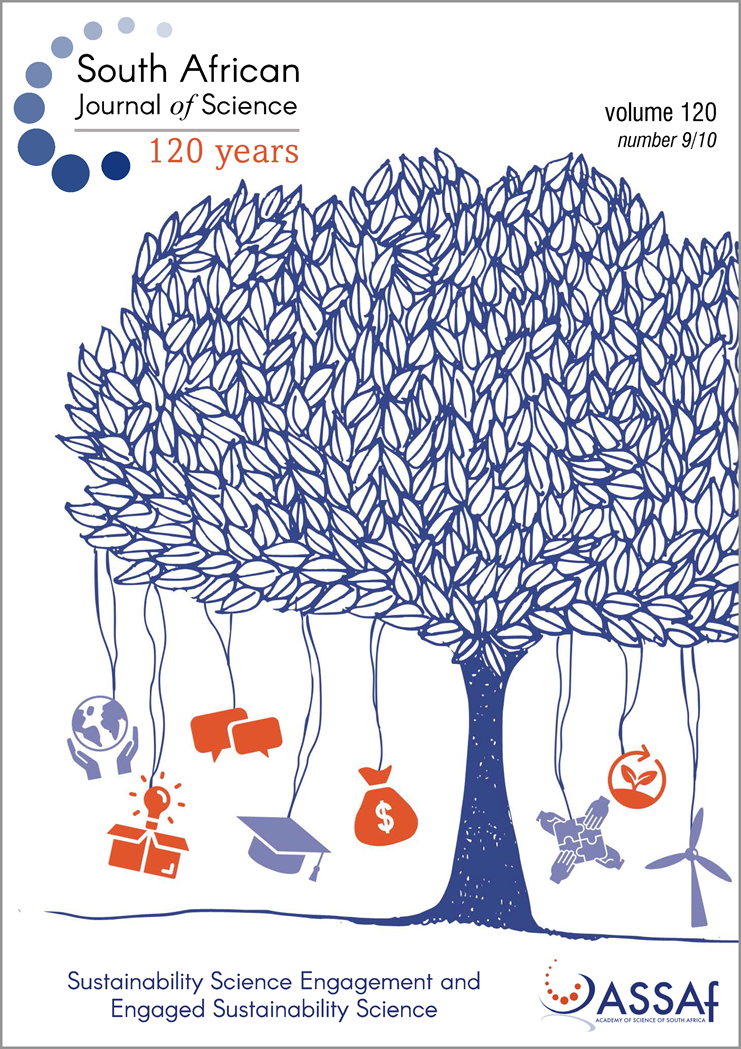Local and national stakeholders collaborate to take on Prosopis invasions with biological control and biomass use in South Africa
DOI:
https://doi.org/10.17159/sajs.2024/17928Keywords:
invasive species, Prosopis, collaboration, biocontrol, community of practice, integrated managementAbstract
Research that directs the way stakeholders act and how they collaborate is essential when addressing complex environmental challenges in the field of sustainability science. For example, researchers attempting to manage Prosopis invasions through biological control in South Africa have historically faced challenges from stakeholders. In this study, we illustrate the importance of stakeholder engagement and social learning by outlining the collaborative efforts of various stakeholders to promote effective, integrative and sustainable management of Prosopis invasions in the Northern Cape, South Africa. Through a community of practice approach, stakeholders worked together over the past half-decade in an attempt to develop a National Strategy for Prosopis management and improve its control. This strategy aimed not only to emphasise the need for integration of biomass use (aimed at offsetting the costs of mechanical clearing and necessary herbicide use) but also to underscore the significance of biocontrol alongside other management approaches. Stakeholders also identified that adequate farm-scale planning is necessary to provide a sense of purpose and assist in monitoring of progress. We worked alongside land managers and experts to develop such plans. The engagement of local champions played a crucial role in facilitating collaboration and learning among stakeholders, emphasising the significance of inclusive approaches in addressing complex sustainability challenges. In addition, we gained an understanding of how to develop the community of practice to enhance collaboration that ensures the implementation of plans to better manage Prosopis. Our findings underscore the necessity of meaningful stakeholder engagement and collaboration in effective invasive species management. By promoting understanding and involvement of diverse stakeholders, initiatives can have a greater impact in addressing broader sustainability issues.
Significance:
Our findings highlight the fundamental role of stakeholder collaboration in addressing environmental challenges (e.g. biological invasions), promoting sustainability and fostering social learning. Collaboration facilitates exchange of knowledge, promotes social learning and allows stakeholders to make informed decisions when addressing sustainability issues. Collaborative approaches promote the effectiveness of a community of practice in managing Prosopis invasions in South Africa. Local champions played a pivotal role in facilitating collaboration, bridging communication gaps and promoting inclusive approaches. Sustained stakeholder engagement, transdisciplinary collaborations, effective biological control and market development for biomass products will be essential to improve the sustainable management of Prosopis.
Downloads
Published
Issue
Section
License

All articles are published under a Creative Commons Attribution 4.0 International Licence
Copyright is retained by the authors. Readers are welcome to reproduce, share and adapt the content without permission provided the source is attributed.
Disclaimer: The publisher and editors accept no responsibility for statements made by the authors
How to Cite
- Abstract 417
- PDF 563
- EPUB 256
- XML 72
- Peer review history 334
Funding data
-
National Research Foundation
Grant numbers 84643 -
Department of Forestry, Fisheries and the Environment
-
Schweizerischer Nationalfonds zur Förderung der Wissenschaftlichen Forschung
Grant numbers 400440_152085 -
Direktion für Entwicklung und Zusammenarbeit
Grant numbers 400440_152085












.png)